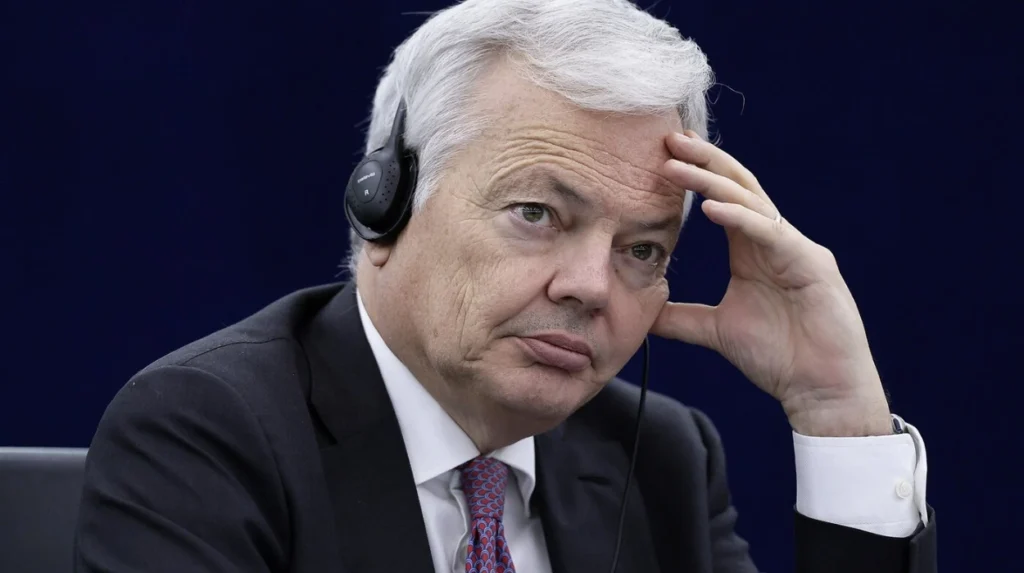Belgian authorities have charged Didier Reynders, ex-European Union Justice Commissioner and former Belgian Deputy Prime Minister, with laundering approximately one million euros, involving suspicious cash deposits and a lottery ticket scheme. Reynders, who denies all wrongdoing, now faces a pivotal investigation with repercussions for European governance, as reported by multiple European news outlets.
Belgian authorities have officially charged Didier Reynders, the former European Union Justice Commissioner and former Belgian Deputy Prime Minister, with money laundering totalling nearly one million euros. The charges, confirmed by the Belgian federal prosecutor’s office, focus on suspicious cash deposits and an alleged lottery ticket cover-up spanning from 2008 to 2018.
Reynders’ Political Career and Accusations
Didier Reynders, aged 66, is a prominent figure in European and Belgian politics, having held senior posts such as Foreign Minister, Finance Minister, and Deputy Prime Minister before his appointment as EU Justice Commissioner in 2019 a post he held until earlier this year. His reputation as a distinguished diplomat and experienced bureaucrat made him one of Belgium’s most influential statesmen.
Origins of the Investigation
According to reporting by Le Soir and Follow The Money, the probe took shape in late 2024 when financial inconsistencies were observed in Reynders’ ING Bank accounts. Investigators discovered approximately €700,000 deposited over a decade, raising the total amount under scrutiny to about €1 million, including various unexplained transactions and cash deposits. The investigation intensified as Belgian authorities questioned why these transactions were not flagged earlier by ING’s compliance protocols.
Details on Money Laundering Allegations
As reported by BLiTZ, Belgian authorities believe Reynders may have used a fabricated lottery ticket scheme to legitimize the unexplained cash deposits, making them appear as luck-driven winnings rather than suspicious business proceeds. Judge Olivier Reloux, assigned to the case, first interrogated Reynders and his wife, Bernadette Prignon, a former magistrate, in December 2024. Prignon, though questioned, has not been charged, as prosecutors investigate whether she possessed knowledge of or had involvement in the financial transactions.
Art Sales and Lottery Scheme
Reynders, as communicated through his lawyer André Renette in a statement to reporters, denied any wrongdoing and asserted that the funds originated from art sales. Authorities are currently attempting to verify documentation related to these claimed art transactions, but have not yet established whether records exist to substantiate Reynders’ defence.
ING Belgium Under Scrutiny
ING Belgium also finds itself under investigation for possible compliance failures. Belgian authorities are reviewing whether ING’s internal controls identified and acted upon the unusually large cash deposits associated with Reynders’ accounts, and why no suspicious activity reports were lodged at the time.
Statement from Reynders’ Counsel
As reported by BLiTZ, Reynders’ lawyer André Renette stated,
“My client has no comments to make except to the justice system,”
highlighting the importance of the presumption of innocence and the confidentiality of ongoing investigations. Renette emphasised,
“The secrecy of the investigation exists to guarantee the presumption of innocence owed to my client, and to preserve the authority and impartiality of the judiciary”.
European Anti-Fraud Office’s Response
The European Anti-Fraud Office (OLAF), responsible for investigating financial crimes involving EU institutions, has declined to comment publicly. In a statement to the Organized Crime and Corruption Reporting Project (OCCRP), OLAF cited confidentiality and the necessity to uphold procedural rights as reasons for its discretion.
EU Reactions and Public Confidence
Some EU observers advocate greater transparency due to the case’s high profile, while others maintain that safeguarding the confidentiality of investigations is essential for maintaining judicial integrity. Analysts believe this episode intensifies doubts about public trust in European institutions, especially since Reynders, as Justice Commissioner, championed anti-corruption and rule-of-law reforms.
Previous Corruption Allegations
Reynders is no stranger to controversy. In 2019, Belgian prosecutors initiated an investigation following accusations from a former intelligence officer, alleging bribery and corruption connected to government contracts—specifically the construction of the Belgian embassy in the Democratic Republic of Congo and claimed links to arms dealers involved in Congolese elections. However, those charges were dropped within weeks, with authorities concluding that “there was no criminal offence.” Reynders dismissed the prior allegations as political manoeuvres.
European Political Context
The case emerges during a turbulent period for EU institutions, following a succession of scandals involving senior officials, such as the “Qatargate” bribery affair in the European Parliament. Reynders’ current indictment is especially impactful, given his former responsibility for promoting transparency, judicial independence, and anti-corruption measures throughout the EU. During his term, he was outspoken on the importance of integrity, notably criticising member states including Hungary and Poland for alleged judicial interference.
Implications for Reynders and the EU
For now, Reynders remains free but under close scrutiny. He has not resigned from his party or retreated from public roles, though speculation surrounds the future of his career. Political analysts fear further erosion of EU citizens’ trust and highlight the symbolic gravity of the allegations: the former Justice Commissioner now finds himself accused of the very crimes he once actively combated.
The Belgian prosecutor’s office is expected to proceed with gathering evidence, focusing on tracing the origins of the funds and identifying any possible intermediaries. Should the case advance to trial, it will prove a significant test of Belgium’s judicial system and the EU’s broader stance on internal governance and corruption.







